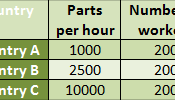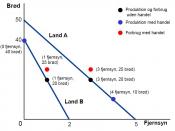International Trade is trade across national borders into other sovereign countries. Domestic trade is intranational trade, that is, trade within national borders.
Trades between nations are based on specialisation. Hence nations trade as:â¢A country may lack the resources needed to produce the goods it wants. This means it does not have the proper factor endowment.
â¢A country may have the resources necessary to produce the goods it wants, but some other country may be able to do it more cheaply. This is known as an absolute advantage.
â¢Even though one country may be able to produce everything more cheaply than another, it will benefit both to trade because the latter country is unlikely to be equally as inefficient in the production of goods as the former country. This means that all countries will have a comparative advantage over the other.
The principle of absolute advantage refers to the ability of an economic industry to produce a given level of a particular good or service with a smaller total input of economic resources per unit of output than other economic industries.
Alternatively, it also refers to the ability of an industry to produce the greatest input from a given amount of resources relative to other competitors.
In international trade, the principle of comparative advantage refers to the fact that although one country may have an absolute disadvantage with another, value can be created for both countries by allocating resources to the most competitive area of the disadvantaged country. This is because an opportunity cost is created when the advantaged country spreads resources across multiple activities instead of concentrating them in its area of greatest strength. Hence simply, a country has a comparative advantage in the production of a good if it can produce that good at a lower opportunity cost...


